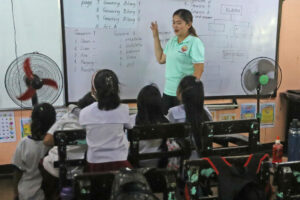




Inflation Update: Green light for easing
 DOWNLOAD
DOWNLOAD

December Economic Update: One for them, one for us
 DOWNLOAD
DOWNLOAD

Philippines Trade Update: Trade trajectories trend along
 DOWNLOAD
DOWNLOAD


PH education faces increasing challenges from climate change

SINGAPORE — The Philippines should localize its approach to education challenges considering its archipelagic nature, a United Nations expert said, as climate change and other emerging risks disrupt classes nationwide and delay the country’s learning recovery efforts following a coronavirus pandemic.
Education governance at the local levels should be the route of countries highly vulnerable to weather and climate disruptions, Mituse Uemura, education advisor of United Nations Children’s Fund (UNICEF) East Asia and Pacific Regional Office, told BusinessWorld on the sidelines of the Asia Philanthropy Summit here on Tuesday.
“There are a couple of things that we learned during the pandemic, one of which is to consider context difference. Context varies from one place to another,” she said.
“A localized approach is needed especially in the context of the Philippines because there’s a huge diversity in terms of the geographical locations and also the climate.”
The Philippines was among the last countries to reopen schools following the coronavirus disease 2019 (COVID-19) pandemic. UNICEF said the lack of preparation in the face of changing climate conditions threatens the progress of the country’s learning recovery efforts.
The National Economic and Development Authority in 2021 said that the lack of face-to-face schooling for one year during the pandemic may result in over P11 trillion in productivity losses over the next four decades.
The Philippines has recently seen class disruptions in many areas due to extreme heat, with official figures as of April 5 showing at least 3.6 million students have been affected by the suspension of classes in 5,000 schools.
The Education department has given school heads the power to decide when to switch to remote learning “in cases of extreme heat and other calamities.” Philippine lawmakers, meanwhile, are discussing whether or not there is a need to return the country’s old academic calendar.
Filipino students were still among the world’s weakest in math, reading and science, according to the 2022 Program for International Student Assessment (PISA), with the Philippines ranking 77th out of 81 countries and performing worse than the global average in all categories.
The Philippine government recently included in its list of priority legislation a bill seeking to establish a national learning intervention program to accelerate the recovery of learning losses incurred during the pandemic.
Myo-Zin Nyunt, deputy director of UNICEF East Asia and Pacific Regional Office, said that over half of Grade 5 children in the Asia-Pacific region cannot read and write properly even years before the pandemic, a situation that’s likely worsened due to the health crisis and persistent threats from climate change.
In the Philippines, the rate hit 90%, according to UNICEF data.
“Learning losses, they existed before COVID-19. Children go to schools but never learn as they are needed to learn,” Mr. Nyunt told BusinessWorld.
“And the Philippines, for one, had the longest school closure. The Philippines closed schools for almost two years. So that has really exacerbated the learning loss,” he said, adding that climate change is exacerbating the learning poverty.
In the face of these risks, the Philippines should pursue a decentralized education system, in which schools and other sectors at the local levels assume key decision-making roles, Ms. Uemura said.
“They don’t have to wait for something to come and then trickle down,” she said. “However, the Department of Education is really advised to provide guidance in some areas.”
But pursuing local education governance should be complemented with capacity-building efforts, Ms. Uemura said, adding that local government units should be given the necessary tools to come up with data-driven decisions in the face of climate and health disruptions.
“At least, it is some sort of a tool to determine the degree of risks to the children’s health,” she said. “It’s something that the National Government can actually help.”
While local governments may consider implementing blended learning in terms of calamities, it should never allow digital classes to replace face-to-face schooling, Ms. Uemura said, noting that the rising number of students who lack soft skills does not bode well for the future of the country’s labor force.
GREEN SKILLS
Meanwhile, Mr. Nyunt said the Philippines should — as early as now — adopt a long-term program that would enhance students’ green skills.
Setting up solar power panels at schools would not only prevent class disruptions during electricity-disrupting weather events but would also promote climate awareness among students, who should be given green tasks from managing battery storage of solar panels to helping craft a climate-friendly environment in campuses.
“So, if green skills are in the curriculum, the children will be very conversant while they’re still young,” he said. “And when they go to secondary and university levels, they will become more active and aware.”
“They will become more aware and more active, pushing for more climate-friendly policies for the government and looking for more green skills,” he added.
The Philippines still fell short of the over $16 billion in required capital investments needed for its green transition, according to a recent report on Southeast Asia’s green economy.
It said the Philippines lacks sector-specific emission targets, and only four of 10 major emitting companies have set net-zero and emissions goals.
Mr. Nyunt said the Philippines has a very young demographic compared with its Southeast Asian peers, and the country needs to ensure its youngsters are taught green skills to help the Philippines in its renewable ambitions. — By Kyle Aristophere T. Atienza, Reporter
This article originally appeared on bworldonline.com





 By BusinessWorld
By BusinessWorld